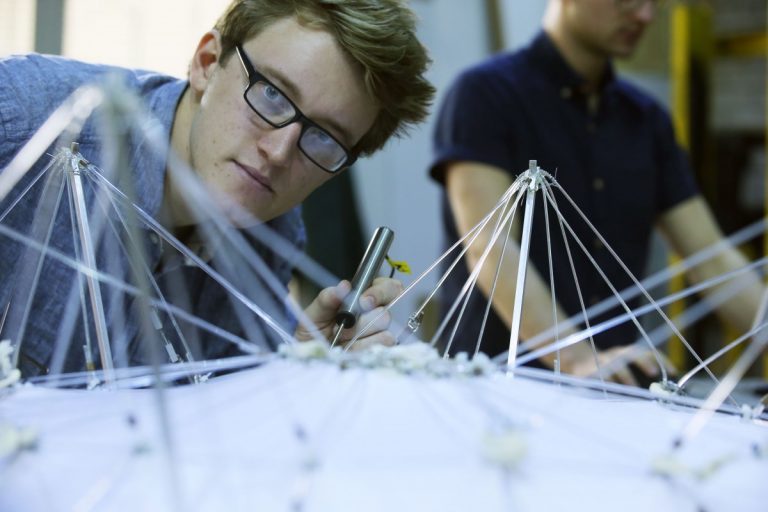
“Projects we have completed demonstrate what we know – future projects decide what we will learn.” – Dr. Mohsin Tiwana
If you have a passion for physics and mathematics – or in fact, just science in general – a career in engineering is likely to be the ideal fit for you.
In a technical era rife with new and emerging technologies, engineers are the problem-solvers and visionaries who tackle highly specialised issues with products, harnessing their vocational prowess to improve the lives of product users and consumers around the globe. Forever striving to forge the most cutting-edge device, machine or system, this is a discipline which keeps professionals engaged, and facilitates a lifelong passion for learning that becomes a multi-disciplinary, multi-cultural and multi-location career.
“Engineering careers have become highly diverse over the past 50 years,” Petr Matous and Abbas El-Zein, senior educators in the field of engineering, write for The Conversation. “They are now tackling complex social issues such as poverty, inequality, disaster recovery or climate change. Their work is in megacities and small towns, remote communities and in both high and low-income countries.
“…An engineer who is driven not only by technical knowhow but also by considerations of social impact and political feasibility will be more effective in helping to develop smart, long-lasting solutions,” the academics add. “We need potential students to understand that engineering is about making lives better.”

But in a graduate employment market that is both saturated and vying, how can students be certain that dream job will still be available to them once they graduate? While the outlook can seem bleak for students of certain subject disciplines, projected industry forecasts for engineering are in a different league. Prospective engineering students will be pleased to know the market is predicted to grow over the next five years, with demand for highly-qualified engineers soaring at a rate never seen before. And the best thing is that this need for educated, forward-facing engineers is both constant and global, with students consistently drawn to a return on investment (RoI) that is seemingly unparalleled.
This steadily-rising demand has bolstered starting salaries, heating up competition among graduate employers who seek fresh perspectives to innovate their brands. According to Forbes, the college degrees with the highest starting salaries throughout 2016 were largely comprised of engineering majors, with chemical, computer, electrical and mechanical engineering snagging four of the top five spots. With such positive job prospects, now is the ideal time to pursue a degree in the engineering discipline.
Here are 5 ground-breaking Schools for aspiring engineers…
SCHOOL OF ENGINEERING, CARDIFF UNIVERSITY – UK
With 1,200 undergraduate students, 400 postgraduates, 100 members of staff and 200 members of research faculty, the School of Engineering is a known powerhouse of the Cardiff University brand.

The School’s undergraduate portfolio is incredibly well-regarded, with programmes that are valued by local, national and international employers. On top of this, a range of newly-developed postgraduate programmes reflect the school’s receptivity to changing industry needs.
The new MSc in Wireless and Microwave Communication Engineering, for example, aims to refine postgraduate experts with desirable expertise in electronic and microwave engineering. While the MSc in Building and Infrastructure Information Modelling (BIM) for Smart Engineering provides the training required to thrive in the competitive fields of BIM and smart engineering.
Cardiff’s MSc in Compound Semiconductor Electronics – another newly-formed course – instils a firm foundation in compound semiconductor theory, fabrication and applications, also teaching how this can be integrated with silicon technology.
The programme is jointly delivered by the School of Engineering and the Institute for Compound Semiconductors (ICS). The ICS is an exciting new development at the cutting edge of compound semiconductor technology. Successful completion of the course empowers students to thrive on a global scale, granting internationally-relevant expertise that can ignite career opportunity in all four corners of the globe.
FACULTY OF ENGINEERING, UNIVERSITY COLLEGE LONDON (UCL) – UK

The Faculty of Engineering at UCL is a hub of activity, consistently enticing students who are looking for a faster pace of life. Located in the heart of London, UCL’s Faculty of Engineering provides exceptional teaching alongside unique vocational opportunities. The Faculty of Engineering Science, UCL Engineering, is made up of 11 diverse departments, covering areas from designing environments that reduce crime to tracking satellites in orbit.
The Integrated Engineering Programme (IEP) is a new integrated framework that combines innovative teaching methods and an industry-oriented curriculum with discipline-specific, accredited degree programmes. Students are given the opportunity to participate in interdisciplinary activities and develop their transferable professional skills in the context of real-world engineering projects.
Since the university’s founding in 1826, UCL has been home to some integral engineering breakthroughs, including the world’s first laboratory devoted to engineering education. Today, UCL is still investing in its engineering departments, with the advanced centre for Biochemical engineering benefiting from a £20 million investment from industry, government and various foundations.
THE FU FOUNDATION SCHOOL OF ENGINEERING AND APPLIED SCIENCE, COLUMBIA UNIVERSITY – USA
Columbia University’s Fu Foundation School of Engineering and Applied Science offers students an exclusive academic opportunity, presenting both undergraduate and graduate students with a comprehensive range of Bachelor’s, Master’s and doctoral programmes in the fields of engineering and applied science.

Here at Columbia, Engineering promises broad-based instruction in a major research hub, instilling ambitious engineers with the technical literacy needed to lead the sector far beyond tomorrow’s world. With courses in Biomedical Engineering, Chemical Engineering, Civil Engineering and Engineering Mechanics, Earth and Environmental Engineering, Electrical Engineering, Industrial Engineering, Mechanical and Computer Engineering, there is no avenue of this lucrative field that Columbia doesn’t explore.
“Innovative approaches—including computer-assisted design, the use of ‘smart’ materials, and collaborations with other Columbia departments in basic science, medicine and business—are opening frontiers in an expanding host of fields: from financial engineering to corrosion control, and nanotechnology to biomedical engineering,” the faculty website notes.
FACULTY OF ENGINEERING, UNIVERSITY OF LEEDS – UK
The Faculty of Engineering at Leeds stands among the world’s top 100 for engineering and technology, also representing one of the largest engineering groupings in the UK, with more than 700 staff and 3,500 students.

Here, teaching is delivered across five schools: the School of Chemical and Process Engineering; the School of Electronic and Electrical Engineering; the School of Civil Engineering; the School of Mechanical Engineering and the School of Computing.
With a long-established reputation for delivering high-calibre research, 85 percent of the Faculty’s research activity has been rated ‘world leading’ or ‘internationally excellent’ by the Research Excellence Framework, earning a range of sought-after grants from Research Councils UK, government departments, the European Union and many industrial sources. The faculty is known to collaborate with powerful organisations – including Shell, Rolls-Royce, Jaguar Land Rover and Google – also boasting influential partnerships and connections with world-renowned researchers.
SCHOOL OF ENGINEERING AND APPLIED SCIENCE, UNIVERSITY OF PENNSYLVANIA (PENN ENGINEERING) – USA
Benjamin Franklin founded the University of Pennsylvania 250 years ago, picturing an institution where classical learning would seamlessly integrate with a practical focus within the arts and science. Penn Engineering emanates this unique vision, preparing students not just to succeed but thrive in a technological world.

Here, undergraduate and graduate programmes place equal emphasis on theory and practice, allowing students to hone intellectual connections that cross multiple subject borders. Penn Engineering elevates a university-wide initiative to prepare students for graduate careers which are high-tech and digitally enriched, equipping them for leadership roles within engineering and beyond, powered by desirable skills such as creativity, quantitative thinking and deep-held dedication.
“Engineers are transforming our world, and at Penn Engineering, they are building it, looping it, networking it, connecting it with nanowires and assembling its molecules into new structures,” Vijay Kumar, Dean of the school, explains. “…Our students play a critical role in posing and answering the questions that will improve human health and transform our world.”
*Some of the institutions featured in this article are commercial partners of Study International
Liked this? Then you’ll love these…
6 of the Top Engineering Schools from both sides of the Atlantic
Cardiff University: A European leader in Compound Semiconductors







